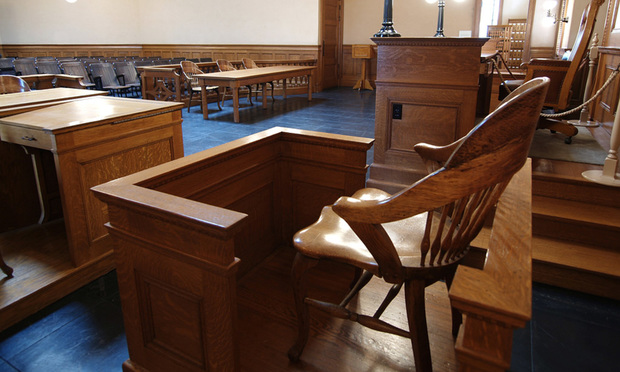Brooklyn Judge Rules DA Cannot Rely on App to Satisfy NY's New Discovery Law
Like other DA's offices around the state, Brooklyn prosecutors have said they have security concerns about the new requirement that they turn over witness information to defense lawyers.
February 21, 2020 at 12:14 PM
5 minute read
 Software used by the Kings County District Attorney's Office to comply with New York's new criminal case discovery reforms falls short of the law's requirement that prosecutors share witnesses' "adequate contact information" with defense lawyers, a Brooklyn judge has ruled.
Software used by the Kings County District Attorney's Office to comply with New York's new criminal case discovery reforms falls short of the law's requirement that prosecutors share witnesses' "adequate contact information" with defense lawyers, a Brooklyn judge has ruled.
The decision is the latest to highlight friction in implementation since its January effective date of the criminal justice reform package passed by the New York Legislature last year.
Like other DAs offices around the state, Brooklyn prosecutors have said they have security concerns about the new requirement that they turn over witness information to defense lawyers.
WitCom, the app used in Brooklyn, is one of several programs in use in various counties as a possible solution. After prosecutors add witnesses to the app's portal, defense lawyers see a list of witnesses to contact, but they can't see their real contact information. In broad terms, the system is analogous to how Uber drivers and passengers can call each other through the Uber app by pressing a button, without seeing real phone numbers.
Lawyers with Brooklyn Defender Services representing Quanyi Feng, who was charged in December with attempted murder, filed papers objecting to prosecutors' use of WitCom in late January.
Acting Supreme Court Justice Matthew Sciarrino on Thursday ordered Feng's defense team to try to use WitCom and to submit a report about the results.
While a defense lawyer did eventually hear back from two witnesses—one who responded WitCom and one who called from a personal phone—both witnesses indicated that prosecutors had prompted them to respond, the defense attorney reported.
Sciarrino found that anonymized contact tools can be appropriate, even helpful, in some situations—but in other situations, WitCom "short circuits the adversarial process by inserting the prosecutor (or their app) as an intermediary between defense counsel and witness," he wrote. The decision of whether to use apps like WitCom should be up to defense attorneys, he ruled.
"Moreover, use of the WitCom app is contrary to the plain meaning of the statute which calls for the People to provide contact information," he wrote. "WitCom—although a novel approach to witness communication—stands for a lack of information, putting defense counsel at an unfair disadvantage."
Sciarrino ordered prosecutors to share an "active and verified email address and cell phone number for their witnesses" with defense counsel, and he stayed the decision for 30 days. The next court date in the Feng case is scheduled for March 23.
He also rejected the comparison of WitCom to popular apps like Uber and Grubhub, which are "voluntarily downloaded as a first-world convenience."
"To argue that the court should accept the WitCom app because millions of people use Uber, Lyft, Grubhub, etc., is ludicrous … They are in no way akin to forcing an adversarial party to litigation to use an app absent a court order," he wrote.
In a statement, a spokesperson for the Brooklyn DA's office said prosecutors are disappointed by Sciarrino's decision.
"We are disappointed by the decision and are reviewing our options," the statement said. "It is our duty to protect our victims and witnesses and fear that a quick internet search of their cell phone numbers will reveal their home addresses. Such an invasion of privacy is unwarranted and was specifically ruled out by the legislature."
Sciarrino noted in his decision that the law requires good cause to be shown before home addresses can be released, and he noted that that issue has not been reached in the Feng case.
Lisa Schreibersdorf, executive director of Brooklyn Defender Services, said in a statement that Sciarrino's decision "affirms and supports the purpose" of the discovery reform law.
"We hope the spirit of this decision sends a message to district attorneys that they should not discourage witnesses from being open and forthcoming with defense attorneys, which will enable the whole truth to come to light and ultimately serve justice," she said.
Barry Kamins, a retired Brooklyn Supreme Court justice, said the case is an early example of the issues that will need clarification in the new law.
"The decision is one of the first decisions to wrestle with the definition of "adequate contact information" in the new discovery statute," Kamins said. "Judges will be asked in many cases to determine whether virtual information from a secure portal can substitute for an actual email address or a verified cell number of a prosecution witness."
Read more:
Upstate Judge Sets Aside NY Bail Reform Law as Unconstitutional in Misdemeanor Case
Prosecutors Brace for Sweeping Change as NY Criminal Justice Reforms Take Effect
This content has been archived. It is available through our partners, LexisNexis® and Bloomberg Law.
To view this content, please continue to their sites.
Not a Lexis Subscriber?
Subscribe Now
Not a Bloomberg Law Subscriber?
Subscribe Now
NOT FOR REPRINT
© 2025 ALM Global, LLC, All Rights Reserved. Request academic re-use from www.copyright.com. All other uses, submit a request to [email protected]. For more information visit Asset & Logo Licensing.
You Might Like
View All
Class Certification, Cash-Sweep Cases Among Securities Litigation Trends to Watch in 2025
6 minute read
Health Care Data Breach Class Actions Saw December Surge in NY Courts

AI Startup Founder Defrauded Investors of Millions, US Prosecutors Say
3 minute read
Legal Leaders See AI's Multitude of Uses as Both Blessing and Curse
Trending Stories
- 1'It's Not Going to Be Pretty': PayPal, Capital One Face Novel Class Actions Over 'Poaching' Commissions Owed Influencers
- 211th Circuit Rejects Trump's Emergency Request as DOJ Prepares to Release Special Counsel's Final Report
- 3Supreme Court Takes Up Challenge to ACA Task Force
- 4'Tragedy of Unspeakable Proportions:' Could Edison, DWP, Face Lawsuits Over LA Wildfires?
- 5Meta Pulls Plug on DEI Programs
Who Got The Work
Michael G. Bongiorno, Andrew Scott Dulberg and Elizabeth E. Driscoll from Wilmer Cutler Pickering Hale and Dorr have stepped in to represent Symbotic Inc., an A.I.-enabled technology platform that focuses on increasing supply chain efficiency, and other defendants in a pending shareholder derivative lawsuit. The case, filed Oct. 2 in Massachusetts District Court by the Brown Law Firm on behalf of Stephen Austen, accuses certain officers and directors of misleading investors in regard to Symbotic's potential for margin growth by failing to disclose that the company was not equipped to timely deploy its systems or manage expenses through project delays. The case, assigned to U.S. District Judge Nathaniel M. Gorton, is 1:24-cv-12522, Austen v. Cohen et al.
Who Got The Work
Edmund Polubinski and Marie Killmond of Davis Polk & Wardwell have entered appearances for data platform software development company MongoDB and other defendants in a pending shareholder derivative lawsuit. The action, filed Oct. 7 in New York Southern District Court by the Brown Law Firm, accuses the company's directors and/or officers of falsely expressing confidence in the company’s restructuring of its sales incentive plan and downplaying the severity of decreases in its upfront commitments. The case is 1:24-cv-07594, Roy v. Ittycheria et al.
Who Got The Work
Amy O. Bruchs and Kurt F. Ellison of Michael Best & Friedrich have entered appearances for Epic Systems Corp. in a pending employment discrimination lawsuit. The suit was filed Sept. 7 in Wisconsin Western District Court by Levine Eisberner LLC and Siri & Glimstad on behalf of a project manager who claims that he was wrongfully terminated after applying for a religious exemption to the defendant's COVID-19 vaccine mandate. The case, assigned to U.S. Magistrate Judge Anita Marie Boor, is 3:24-cv-00630, Secker, Nathan v. Epic Systems Corporation.
Who Got The Work
David X. Sullivan, Thomas J. Finn and Gregory A. Hall from McCarter & English have entered appearances for Sunrun Installation Services in a pending civil rights lawsuit. The complaint was filed Sept. 4 in Connecticut District Court by attorney Robert M. Berke on behalf of former employee George Edward Steins, who was arrested and charged with employing an unregistered home improvement salesperson. The complaint alleges that had Sunrun informed the Connecticut Department of Consumer Protection that the plaintiff's employment had ended in 2017 and that he no longer held Sunrun's home improvement contractor license, he would not have been hit with charges, which were dismissed in May 2024. The case, assigned to U.S. District Judge Jeffrey A. Meyer, is 3:24-cv-01423, Steins v. Sunrun, Inc. et al.
Who Got The Work
Greenberg Traurig shareholder Joshua L. Raskin has entered an appearance for boohoo.com UK Ltd. in a pending patent infringement lawsuit. The suit, filed Sept. 3 in Texas Eastern District Court by Rozier Hardt McDonough on behalf of Alto Dynamics, asserts five patents related to an online shopping platform. The case, assigned to U.S. District Judge Rodney Gilstrap, is 2:24-cv-00719, Alto Dynamics, LLC v. boohoo.com UK Limited.
Featured Firms
Law Offices of Gary Martin Hays & Associates, P.C.
(470) 294-1674
Law Offices of Mark E. Salomone
(857) 444-6468
Smith & Hassler
(713) 739-1250






